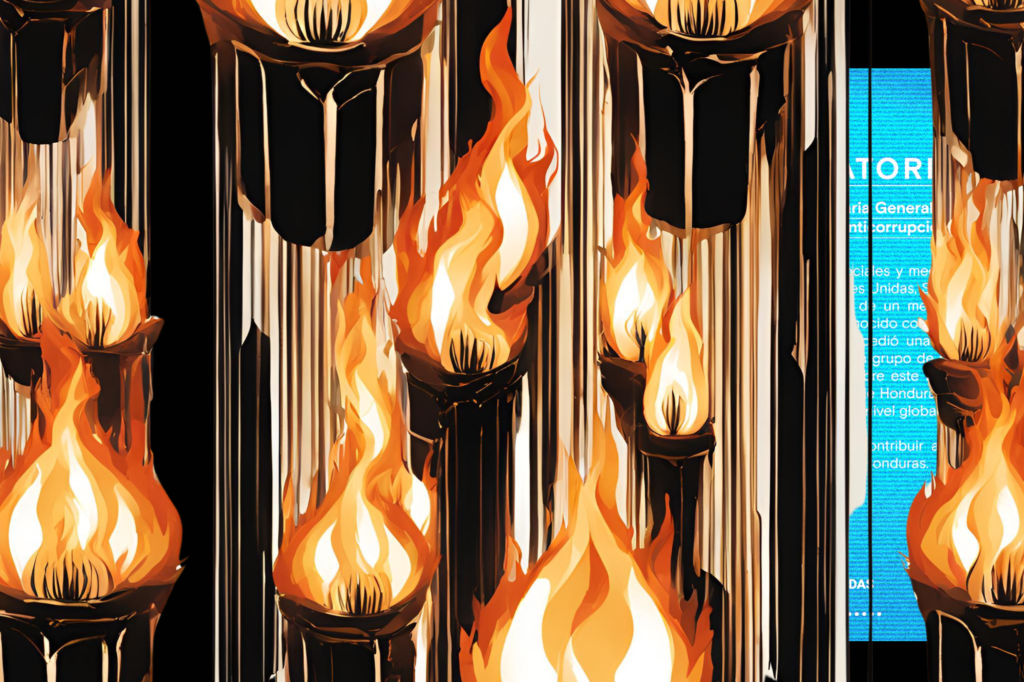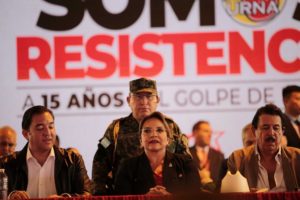Text: Contracorriente
Contracorriente defends journalism as a pillar of democracy, therefore our independence and freedom of the press cannot be compromised by any organization or government. Today we have to respond to a statement from the United Nations Office in Honduras because it makes us more vulnerable in the face of the power that we rebuke.
On December 12, 2024, the United Nations Office in Honduras published a clarification statement «regarding the expressions circulating on social media and in the media referring to the Deputy Secretary-General of the United Nations, Ms. Amina Mohammed» clarifying that «the Deputy Secretary-General did not grant a specific interview on this issue. In the context of a meeting with a group of journalists that took place more than a month ago, when asked about this issue, the Deputy Secretary-General recalled that negotiations with the State of Honduras are ongoing and the rest of her response referred to issues of impunity at a global level.»
Although they do not mention it directly, they refer to a note and a video published by Contracorriente on December 10, 2024 in which we quote the Deputy Secretary General of the United Nations Organization Amina J. Mohammed as she answered a question from journalist Vienna Herrera within the framework of the Reham al-Farra Memorial Journalism Fellowship (RAF) organized by the UN with which she covered the 79th UN Assembly in New York on September 26, 2024 and which was extended until a virtual meeting in November 2024.
Contracorriente has a manual for public response, rectification or clarification so that people or organizations that consider they were not treated fairly in a report or news article can complain. We regret that the United Nations Office did not use the appropriate procedure to clarify what they consider was not treated fairly or rigorously in the news article.
After the United Nations Office of Honduras carried out this action, the government of Honduras, through its Foreign Minister Enrique Reina, described it as «fake news,» ensuring that the interview «never happened,» referring to the quote from the deputy secretary published by this medium. This distorts the information and ignores the facts, data and other statements of various analysts presented in the journalistic note to give context to the Cicih issue, and is especially delicate since the chancellor himself did not respond to our interview requests to obtain the version of the government in this regard.
As our main commitment is to the audience, we want to share with you the specific question and the full transcript of Deputy Secretary Amina Mohammed in a virtual meeting (on the record) with the Deputy Secretary on November 14 organized by the UN RAF scholarship, with the chosen scholarship recipients. Journalist Vienna Herrera asked the following question, which was sent via email 15 days prior to the meeting:
Full question:
Honduras is currently in discussions with the UN regarding an agreement to establish a Commission Against Impunity and Corruption, similar to one that previously existed in Guatemala. These negotiations have been ongoing for some years, and it is said that one reason the agreement has not been finalized is that this government, in its early months, approved a law granting immunity to all former officials from the administration of former President Manuel Zelaya, who is the current president’s husband, for any crimes related to public administration. Could you clarify if this is accurate?
Transcripción de la respuesta íntegra en idioma original:
Oh yeah, I can’t go into the details of where we are on this particular issue what I can say is that memorandum of agreement for the UN to support Honduras to do this is in its way and it is taking years because essentially the reason for wanting to put an institution like that together is that we do not have sufficient justice and accountability, within a society and where government owes its people to do just that. There is, you know, the three arms of government, where government deals is institutions, the Judiciary and the Parliament, but they’re not working well enough. I know that in my country, we put together an anti-corruption institution, and it took quite a while to do.
The biggest and contentious issues are always inmunity and we tend to, we focus on that because many will feel that that’s a huge loophole for people to go through, if we’re trying to be trying to get Justice and accountability. And we have to try to do something about that. I don’t know that we should spend many more years because that becomes the one barrier that we’re trying to get over. Or do we set the institutional and know that we’re going to have to have a progressive way to get to what we want to be. And I say that now because quite frankly look around you, there are countries who have these institutions and who still with impunity run their countries. So I think it’s always better to have that institution to have it, roll out, what it is intended to do and in terms of justice and accountability transparency and then work on implementation of that institution’s mandate.
So the struggle I think continues to try to get it done and I think, you know, the message needs to be: Impunity is one of the reasons why was setting up the institution to begin with. But every country is different in how badly that is ingrained in the fabric of the society. And if that’s the case, you’re not going to be able to start from here. You will have to start from the foundation incrementally to get to where you need to get to.
So I don’t want to, you know, I don’t want to shape, you know whatever is happening in Honduras with that process as it is. But I do think there’s a sense of urgency. This is being going on for a few years. It needs to get to a conclusion. But perhaps you will have to take less to get more in the longer time or you keep going for the longer time to get everything that you want. But understand that in the meantime, many people are going to lose, lose their lives. Impunity will increase and be more difficult to roll back. I mean, there are certain realities to this for which discourses need to happen. And we know that governance is a massive problem across the world. It’s a global issue.
The news article published by this media outlet quotes the vice-secretary in Spanish as follows: «The biggest and most controversial issues always revolve around immunity. We focus on that because many consider it a huge loophole that allows justice and accountability to be evaded, and we have to try to do something about it. I don’t think we should spend many more years on this issue, since it becomes the main barrier that we are trying to overcome,» she explained, after being asked if the approval of the Law for the Reconstruction of the Constitutional State of Law and for the Facts Not to be Repeated, better known as the «political amnesty law,» which grants amnesty to people who were victims of the coup d’état and former employees or elected authorities during the government of former President Zelaya Rosales, including corruption crimes, has had weight in the negotiations for the Cicih.»
On the other hand, in the news article, journalist Vienna Herrera sought out other analysts, including the Honduran Leonardo Pineda, who added that the delays in legislative reforms were also delaying the installation of the Cicih. In our publications we have never said that the agreement is not still being negotiated and on the contrary we contribute to explaining what stage it is in, a matter of public interest. While it is true that the statements were made 30 days ago, the news article is not based solely on them, it updates the issue and gives various perspectives on the concerns surrounding the negotiation of the agreement between the UN and the government of Honduras for the installation of the international anti-corruption organization. Where we accept an omission was in explaining the context in which our specific question was answered (a virtual meeting on the record last November 14).
Contracorriente will continue to do journalism and address the concerns of Honduran society regarding corruption, lack of transparency and impunity in the country.





